Tom's Camping Journal
The Jefferson River Walk
Wednesday August 29th - Monday September 3rd, 2001
Crayfish are a delicacy to a landlubber like me. Also known as "crawdads", these critters are essentially scaled-down, fresh-water lobsters. Crayfish and trout are about as close as we ever get to "seafood" here in land-locked Montana. I thoroughly enjoy our local venison, beef, and wheat, but also crave every little taste of sea food I can get. So I was thrilled to see the crayfish peeking out from below their rocky shelters in the bottom of the river. Although they are always here, they are usually too small to bother with. This time, however, the crawdads measured three to four inches long, small by southern standards, but definitely big enough to eat. Dustin, Jeff and I put down our pack frames just a few hundred feet from our starting point and spent the next couple hours catching crawdads.
We were near the end of the Bighole River only a mile or two upstream from the junction with the Beaverhead River, where the two combine to form the Jefferson. It was just three months back that I was last drawn to this area to camp and explore the lively river corridor. On that trip we paddled down the river by canoe, moving swiftly along with the current while steering around those dangerous submerged trees in the water.
But now, late in the season and after several consecutive years of drought, the rivers were so low that a person would be dragging a canoe more than paddling it. We left our canoe and home and walked instead. I noticed immediately that it was easier to stop and gather resources when walking.
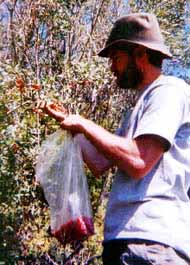 Before picking up our packs again, we collected about sixty crayfish for dinner-- based on an estimated serving size of twenty each--then gathered a bunch more just because it was so much fun turning over rocks and catching the little clawed critters. It was a good thing we gathered them when we did, since we never found another good spot to harvest them. Downriver on the Jefferson, the crayfish were smaller and not nearly so abundant.
Before picking up our packs again, we collected about sixty crayfish for dinner-- based on an estimated serving size of twenty each--then gathered a bunch more just because it was so much fun turning over rocks and catching the little clawed critters. It was a good thing we gathered them when we did, since we never found another good spot to harvest them. Downriver on the Jefferson, the crayfish were smaller and not nearly so abundant.
We carried most of our catch in a pot of water and wrapped the rest in a bandana, which we periodically dipped into the water as we went along. We didn't go far though before we stopped to investigate a patch of arrowhead or wapato, hoping to find some starchy tubers. On the coast the tubers grow to the size of a small egg. But here they were only about the size of a pea, not worth the trouble to harvest. Instead we gathered rosehips nearby and ate them as fast as we could right off the bushes. It was so dry everywhere that the grass just crackled and crunched under our footsteps.
It was good to be close to the river, where at least the air was a little more humid. Yet it was still so hot and so dry that even the fish suffered. The Montana Department of Fish, Wildlife & Parks shut down all fishing on the Jefferson River just a few days before our trip, to protect the heat-stressed fish. We passed one small pool just a few feet in diameter where cool ground water seeped into the river, attracting about a dozen large trout to the spot. They seemed to be gasping for air, as if they just couldn't breathe in the warm, oxygen starved river. We could have jumped right on top of them and grapped an easy and delicous meal, but I agreed with the decision to close the river to fishing. Those fish were clearly stressed enough already. We watched for a moment, then continued on our way.
Next we found a pond without water, where the entire population of pond snails clinging to the mud-covered bottom for life. Obviously the mud would dry out in a few more days and all the snails would be dead. I've never eaten pond snails before, but hey, there is a first time for everything, and these were so easy to gather that we could hardly pass up the opportunity. We only gathered a sampling though--not much over a cup--since we figured we would have limited appetite for such things!
We covered only a few miles before making camp, then found a nice rocky beach where we would be able to make a small fire beside the water, far away from the dry grass in the woods. But it wasn't time to make dinner. It was time to nap.
Being out just a couple days before the full moon, we knew we would have good moonlight for night-walking. Night walking is always exciting anyway, but also made sense, because the extreme fire danger seriously limited our shelter options. It would simply be easier to walk at night than to build an insulated shelter to sleep warm without any form of fire. We would also be able to wear more of our clothes and gear at night, therefore carrying less on our backs. The only problem with walking at night is that it can be very difficult to sleep in the day. We split up to find our own patches of shade to nap in. I never did fall asleep, and I don't think Jeff did either. Dustin slept some, but only because he was already sleep-deprived before the trip.
Trying to impose sleep in the middle of the day like that seemed very artificial and imposed, rather than spontaneous and intuitive, but sometimes these adventures start that way until we learn to blend and flow with the time and place. It takes awhile to tune in and become part of the natural world.
We rested as long as we could, then Jeff brought out his bowdrill set and started a small cooking fire by the water. Dustin shared this note from his journal:
"Watching Jeff skillfully start a fire with his bowdrill was amazing. This wasn't on TV or in a book. It was right here in front of me. Jeff actually started a fire using everything from the land. He went from around 5'10" to 10' tall. AMAZING!"
This would be his third expedition with me. The other trips were both in the winter. For dinner we cooked up the crayfish, snails and some rice. I ate a few crayfish simply cooked, but otherwise cracked open most of my share and mixed the little bits of crab-like meat into my rice, along with the rubbery snail bodies plucked out of their shells with a small, pointed stick. The snails were a little bit gritty, but actually much better than expected. I must have eaten about thirty of them with my rice and crayfish.
The sun was down and the moon was out by the time we finished eating and packed up to walk again. We headed downstream along the river bank through the grass and cottonwoods and swamps by moonlight, hoping we would not walk on a rattlesnake along the way. We didn't. Jeff wrote in his journal:
"It was an amazing wonderland of wildlife and activity. Every minute or so another animal was seen or heard nearby. We encountered a couple of playful beavers, countless species of birds and deer at every corner. At one point, Tom wondered aloud whether we were in Montana or in tropical Africa. The birds especially were amazing as they would suddenly evacuate a tree in large numbers or fly in such huge flocks that one could hear their cutting of the air above. The full moon, clear sky, and occasional wispy clouds simply added to the magic."
Navigating a path along the river was slow and often challenging. We walked for several hours, but didn't cover much ground. Finally we grew tired and plopped down for a nap on a sandy beach beside a log for a windbreak. We figured we could rest until we got too cold, then move on. A resident mouse scampered across each of us as we slept, or tried to sleep. I think Jeff and Dustin each slept for a short time. I was never convinced that I actually fell asleep.
We continued on our way, bushwacking through the willows, sometimes getting our feet wet crossing small channels along the river's edge. Finally the bushes and swamps became so thick that we had to walk up into the bone-dry hills away from the river to get anywhere at all. Late into the night the moon began to set and we knew it would be pitch black until dawn. In these severly desertified, almost grassless hills, it wasn't hard to find a gravelly gully where we could safely light a fire. I don't think we could have started a wildfire there if we tried. There simply wasn't anything to burn, except the cottonwood branches we carried up from the swamp at the end of the gully. We slept around the fire for warmth until morning.
Packing for the trip was a bit unusual, mostly due to the extreme fire danger. There were not any fire restrictions on the river, but there were up in the National Forest, where we would be towards the end of the trip. Fires were limited to established campsites, plus we were required to carry a bucket and a shovel. These restrictions seemed very reasonable given the circumstances. So I strapped a five-gallon bucket and a fold-up camp shovel onto my packframe, then put all my gear inside the bucket. Although the bucket was a bit heavy, it was really handy to have along, partly to use as a seat at camp, but also to thoroughly drench our fires as we left each site.
Without the fire restrictions I think we all would have packed about half as much food and gear and possibly just used fanny packs instead of pack frames. However, we also had home-built alcohol-fueled camp stoves, plus lots and lots of food-- at least for three guys who are supposed to be living off the land. It's kind of like rocket propulsion I guess: the more mass we had the more fuel (i.e.: food) we needed to propel it. Adding more fuel adds more mass and therefore requires more fuel. So we brought even more food. We walked only about three miles that first day, but burned up lots of fuel in the process--mostly trying to consume our extra trail mix to lighten the load. Our packs must have weighed fifteen to twenty pounds apiece when we started.
Anyway, after a night of limited sleep we lollygagged around camp in the morning, then cooked up a wheat cereal with trail mix blended in for flavoring. We also harvested a nice pot full of purslane greens and cooked those too. That was a treat. It's been years since I've eaten purslane.
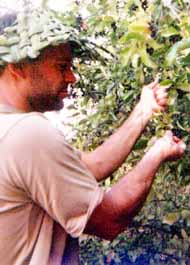 Getting to know each other takes a bit of time on these trips, especially since we are often walking, or working on certain skills, or simply engaged in solo time to explore nature on our own. Jeff, I feel like I know quite well from our previous trips and through continued correspondence via e-mail. We were both raised in suburban environments within a culture disconnected from the natural world. The wiring in our brains was patterned for suburban life, not for living outside or for using our hands and pocketknives to make useful things like bowdrill fire sets and packframes. I know how difficult it has been for me to learn most of these skills, and Jeff's journal notes ring very similar:
Getting to know each other takes a bit of time on these trips, especially since we are often walking, or working on certain skills, or simply engaged in solo time to explore nature on our own. Jeff, I feel like I know quite well from our previous trips and through continued correspondence via e-mail. We were both raised in suburban environments within a culture disconnected from the natural world. The wiring in our brains was patterned for suburban life, not for living outside or for using our hands and pocketknives to make useful things like bowdrill fire sets and packframes. I know how difficult it has been for me to learn most of these skills, and Jeff's journal notes ring very similar:
"I find that in the first few days, my mind fights everything. I am not able to eat whenever I want, nor can I follow the schedule I'm used to. Also, I am constantly doing activities on these wilderness walks that I am not very good at. Many times on this trip and others, I asked why I wanted to spend time this way. And yet, when the calm divinity of nature breaks through and my mind finally surrenders to quiet, I know the reason. Days seem like months, smells and sounds are sharper and the soul is singing."
Dustin did grow up in the outdoors. Living in a rural place and with very little parental supervision, he and his friends turned to nature for entertainment. Camping, fishing and hunting was a part of every day life. Dustin told us much about his wild childhood and things like the way he and his friends would remove the lead tips from bullets and replace them with spitballs-- which they then shot at each other. He went on his first solo camping trip when he was nine years old. As an adult he has become a serious rock climber.
Dustin grew up camping with inadequate gear, a practice which he carried over into adult life. On winter trips he always kept his water bottle inside his sleeping bag at night to keep it from freezing. He kept his first worn-out old sleeping bag up until one cold night when the water bottle froze right inside his bag.
For a person who is accustomed to adventure and living life on the edge, I was concerned that this trip would be a bit slow and boring. I know he was surprised at how much gear and food we brought on this "survival" trek. But Dustin was hardly the odd-man-out in the group. He and Jeff had a lot in common from their highschool and college experiences--mostly recounting some of the wild parties--plus sharing tales from international travels to South American and Asian countries. Both of them were accustomed to a lively social life, and they found much to talk about.
I'm a bit more introverted. All I ever wanted to do as a teenager or young adult was to go to Grandma's house. That was the extent of my social life.
Although I enjoy these kinds of expeditions, I have a tendency to exist in my own space. My comfort zone is about fifty feet away from anyone else, especially when walking. I have to remind myself periodically that each of us have a different experience of the same time and place, and I should at least share a little of what I know about the local plants, nature awareness and primitive skills. I was even more distant than usual on this trip, just burned out I think after a very busy year. I enjoyed being around Dustin and Jeff as much as an introvert possibly can. I truly thought they were great company, and yet I still found myself day-dreaming about going on a solo expedition.
After breakfast we packed up and started walking again. Jeff brought his water filter along, and refilling our water jugs was the first order of business when we reached the river. I was glad Jeff brought his water filter; it is a lot more efficient than mine.
Our intent on this trip was to walk right down the river, but there is only so much walking on river cobbles or wading through moss and muck that a person can handle. We gravitated towards the grassy banks, mostly following cow trails through the willow thickets. We found a beautiful bush loaded with buffaloberries and picked several cups worth to take with us. The berries are extremely tart fresh, but surprisingly addictive when you eat one at time while picking.
We walked to the mouth of Hell's Canyon before stopping, but that was still only about six miles from our original drop-off point. There we took naps, went swimming, exploring, made bowdrill fire sets, saw a rattlesnake, and cooked dinner. I choose not to kill rattlesnakes, partly because there is not enough meat on them to justify it, but also because there are not nearly as many rattlers around now as there once were.
I did catch a couple large crayfish and several smaller ones too. I figured the small ones were tender enough to eat shells and all, at least after pulling off the legs and claws. We made an all wild soup with the crayfish, goosefoot leaves and seeds, and purslane. Jeff exclaimed that it was delicious (but gave the crayfish to me) while I thought it was sufficiently palatable to call it food. Dustin never did express his opinion of it.
Then we boiled up the buffaloberries with sugar and used pancake mix with a small amount of water to make a thick dough for ashcakes. We made some ashcakes plain, cooked as flat patties on the coals, then poured the buffaloberry sauce over them. We also made buffaloberry turnovers. These were made by pouring a little berry sauce in the middle of a patty and then folding and pinching the patty closed. We cooked those in the coals too, and poured extra buffaloberry sauce on afterwards too. This desert was enjoyed much more enthusiastically by everyone and certainly provided the bulk of the calories in our meal. I'm not sure how many other skills Dustin took home from the trip, but he never stopped talking about ashcakes after that. We brushed our teeth before settling down to sleep around the fire.
Our planned route for the expedition spanned sixty miles, none of which really mattered, but at our pace of three miles a day it would take a very long time to get anywhere, so we were feeling the need to cover some miles. We especially wanted to get to a favorite camping spot downstream. However, we knew it would not be sustainable to pack up and start walking in the beginning of the evening, so instead we decided to sleep until we were cold or just awake, then we could depart in the middle of the night.
We slept soundly around the fire until about 3 a.m. The night was still remarkably warm. By the light of the moon we tied our gear to our packframes and walked the dirt road beside the river. It was still night when we reached the highway and crossed the bridge. We refilled our water jugs there by moonlight and checked the map with the aid of a nearby yard light, then headed out across the fields in search of the railroad bed. With the setting of the moon, the night just got darker and darker, but the way I figured it, there should have been just flat fields and a few fences between the river and the railroad. So I was suprised when we walked right into a swamp.
The water wasn't very deep, but the uncertainty of what lay ahead was a definite problem. Here we were in the middle of a drought sloshing through a field of grass or sedges flooded with water. It may have been flood irrigated, but there seemed to be too much water for that. Navigating through this swampy land in the dark made me think of the Allied pilots downed behind enemy lines in World War II and how they had to sneak back across unfamilar country, sometimes crossing hundreds of miles in secret. Of course they were doing it for real. This was recreation for us.
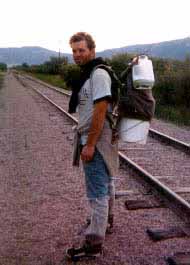 Finally we found the railroad bed and turned to walk down river on the rails. One thing that has to be said for human-made rails, trails and roads, is that you can really put the miles on in a hurry. We walked until dawn, then walked some more.
Finally we found the railroad bed and turned to walk down river on the rails. One thing that has to be said for human-made rails, trails and roads, is that you can really put the miles on in a hurry. We walked until dawn, then walked some more.
I really expected that part of the land to be just open fields or sagebrush pastures, but in fact it was all very green, lush and often swampy and brushy along the railroad. In the early morning light we could see that it was a beautiful place and the whitetail deer bounded out right and left every where we went. We were definitely not hidden walking along the railroad bed, but not usually very visible either. A school bus stopped by each of the nearby houses to pick up the kids. We stopped for a morning snack of buffalo berries and trail mix. We blended them together to make sure we ate more of the wild foods and to extend our trail mix, which was by now running low. Of course we ate rosehips everywhere we went.
One house near the tracks had a beautiful apple tree all loaded with fruit. I looked at it longingly, but kept walking. Moments later we found another tree next to a dirt road beside the tracks. That one looked like fair game. We must have eaten a dozen apples between us as we quickly picked fifty more and stuffed them in our packs and pockets. As we continued down the rails munching on apples, Dustin commented that the trip description should include "hobo skills".
Farther down the railroad we found some very out-of-season asparagus growing beside the tracks. There were tons of old stalks lining the fences, but these were closer to the tracks and just ripe for picking. The normal season for asparagus is in May. I thought this was odd, but also so tempting that it could not be refused. Setting reason aside, we picked the stalks and ate them right there. I thought about it some more as we walked, and concluded they must have been sprayed with herbicides, which are usually some form of growth hormone. Another patch of ripe-for-the picking asparagus confirmed it by the tell-tale curly tops of the plants... they too had been sprayed. Yuck!
Dustin seemed to enjoy the walking, since we were doing something active. The miles were harder for Jeff, but I usually try to push his buttons a little anyway. We covered about fourteen miles by mid-morning when we arrived at the river and stopped for a longer rest.
The trout seemed much happier in this part of the river. Perhaps the overcast skies of the last twenty-four hours helped to keep the water from getting so hot. The deeper channel through this section must have helped too. With all the trout jumping for flies, the water was not still for a moment. Some swam close by our viewing rocks. We jumped in for a quick swim too. The water definitely seemed cooler.
We napped, snacked, and made a small amount of dogbane cordage before continuing on our way. Soon we found a small swamp with cattails and pulled up a good crop of roots for dinner. That is a surprising thing about the Jefferson River, that there are not more cattail swamps along the way. Jeff shared these notes from his journal:
"We walked up on a small mud hole full of cattails and Tom suggested we pick a bunch. The hole smelled like bad gas which, of course, was swamp gas. I was very worn out at this point and tired of wet feet, and was therefore about to ask if we would have to step in the mud to get the cattails. I did not ask, however, since I already knew the answer. As I took off my shoes along with Tom and Dustin, I could smell my socks and they stank. We then wallowed in the mud with our legs often sinking up to mid-thigh. We dug way down to retreive the cattails, roots and all, and finally pulled out a large pile. We were laughing at the squishy noises of our legs in the mud and at one point I thought a full-out mud fight would ensue. We soon got out and washed off by the nearby river where we proceeded to weave visors from the cattail leaves."
We bush-wacked another four miles to a wickiup shelter I saved from a previous trip. The whitetail deer seemed to bound out from behind every bush as we traveled. My view of the place has changed since I paddled down river just a three months earlier.
At that time I saw what a wonderland of wildlife the Jefferson River was, and added the entire river to my "shopping list" of special places that should be saved from development. Not only did I want to save it from development, but it would also be nice to keep the entire river system-- plus the swamps, cottonwood groves and meadows-- open to public and wildlife use. I realized that a piece-meal approach would never get the required action or results, that the project needed a vision that people could grab on to, a project I now call 3Rivers Park. Eventually, through both private and public means, I would like to create this park following the entire length of the Jefferson, Madison and Gallatin Rivers. It will take more than my lifetime to complete, but it has to start somewhere, or we lose the river forever. As we traveled along the river on this trip, I found myself thinking of it as a park already.
We arrived in camp in a wind storm, and rain seemed to be falling farther up river, but the storm only spit at us. We moved into the wickiup left-over from my May canoe trip. It is basically a tipi-like structure built of poles and debris scraped off the ground. Immediately we collected firewood and started a small fire inside. For dinner we ate the starchy cores of the cattail roots, plus ashcakes with instant green pea soup mixed thick enough to be scooped onto the ashcakes like refried beans. We slept soundly around the fire, adding small pieces as needed to keep the shelter warm through the night.
It was nice to stay through an entire night in one place. After walking eighteen miles yesterday, this would be a sort of "day off" to work on skills before emarking on the hike back over the hills to Pony. For breakfast we cooked oatmeal loaded with apples and buffalo berries.
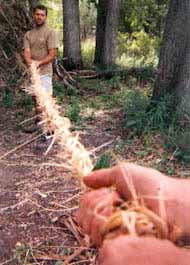 One problem that needed attention was the cattail straps on Jeff's backpack. We improvised those straps from cattail leaf cordage on an earlier trip, and they worked great for awhile, but finally wore out. One of the straps actually came apart on the first day, about fifty yards from our drop-off point. I had an extra strap of buckskin and reinforced the strap to get by until we got around to replacing it. Later we had to reinforce it more with our bandanas, so this seemed like a good time to upgrade to newer straps. But instead of using cattail straps we experimented with clematis vines and twisted them into cordage. The clematis rope was easy to make and seemed like it would function well as a rope swing, or in any application where the rope was straight, but tying it into knots proved to be a real problem. Some of our knots were more than six inches in diameter. Cinching them down any tighter caused the vines to start snapping. Jeff managed to get by with the clematis straps for the rest of the trip, but they were problematic and not very comfortable. I guess we will stick with cattail straps in the future. Dustin and I were also able to finish some working bowdrill sets on that day, since we were otherwise borrowing Jeff's to start the fire.
One problem that needed attention was the cattail straps on Jeff's backpack. We improvised those straps from cattail leaf cordage on an earlier trip, and they worked great for awhile, but finally wore out. One of the straps actually came apart on the first day, about fifty yards from our drop-off point. I had an extra strap of buckskin and reinforced the strap to get by until we got around to replacing it. Later we had to reinforce it more with our bandanas, so this seemed like a good time to upgrade to newer straps. But instead of using cattail straps we experimented with clematis vines and twisted them into cordage. The clematis rope was easy to make and seemed like it would function well as a rope swing, or in any application where the rope was straight, but tying it into knots proved to be a real problem. Some of our knots were more than six inches in diameter. Cinching them down any tighter caused the vines to start snapping. Jeff managed to get by with the clematis straps for the rest of the trip, but they were problematic and not very comfortable. I guess we will stick with cattail straps in the future. Dustin and I were also able to finish some working bowdrill sets on that day, since we were otherwise borrowing Jeff's to start the fire.
Throughout the day we collected wild foods like rosehips, chokecherries, goosefoot leaves and wild sunflower heads. I must have eaten about a hundred rosehips every day of the trip. The chokecherries we brought back to camp and pounded to break up the pits. Being related to the almond, the nut in the pit of cherry is very almond-like. You just have to break the pits open and cook or dry the mash to destroy the cyanide content. Of course the pit shells are a bit crunchy, but still edible.
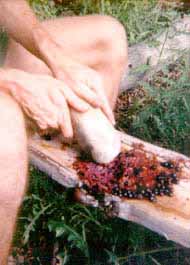 The sunflower heads we rubbed on a rock and tore apart to knock the seeds out, which we then winnowed clean, but we never got around to actually using them. For dinner we "batter fried" the goosefoot greens, apple slices, and cattail shoots. Really it was more like pancakes loaded with greens, but it was really good. For desert we boiled up the "chokecherry-almond" mash with loads of sugar and served it on ashcakes, much like we did with the buffaloberries a couple days earlier. Although it tasted good, neither Jeff nor Dustin seemed to like the crunch of the pit shells.
The sunflower heads we rubbed on a rock and tore apart to knock the seeds out, which we then winnowed clean, but we never got around to actually using them. For dinner we "batter fried" the goosefoot greens, apple slices, and cattail shoots. Really it was more like pancakes loaded with greens, but it was really good. For desert we boiled up the "chokecherry-almond" mash with loads of sugar and served it on ashcakes, much like we did with the buffaloberries a couple days earlier. Although it tasted good, neither Jeff nor Dustin seemed to like the crunch of the pit shells.
Somehow we entered into a conversation about time and space and related topics. I pointed out that time is an illusion both real andnot real and that the future and the past have both happened but still remain in flux. Afterall, time did not exist until the big bang expanded enough to create space. Rates of time remain variable, depending on mass and speed, so it is hardly a "universal constant". For entertainment I've been working on ways to alter the past--as if I don't have enough to do in the present already.
So far, I have to admit that there seems to be a growing number of unexplained anomolies in my childhood, but it seems impossible to prove where they came from. Anyway, I gave an example of premonitions, such as when someone senses that their end is coming and they speak of their last thoughts and wishes to family members, just before being pancaked in a car accident or something on the way to work the next day. It could be said that the accident happened in the future and an "echo" of the event traveled back in time to be picked up by the subconscious mind in the present, causing them to describe their last thoughts and wishes to family members. Since the present is in the past relative to the future, then you could sasy that the future event altered the past.
Dustin mentioned some related anecdotes, such as when he and his friends were headed out for a winter climb and his intuition screamed at him to not go. Although annoyed by his behavior, his friends did not go either, and they all went back to town for something. When they returned later that day, they saw that their climbing destination had since avalanched and they would have been buried in it if they had climbed it that morning. In that case, Dustin intuitively picked up the echo of an event that happened in the future, and subsequently altered the past for himself and his friends.
Part of our mission on this trip was simply to focus on being aware in the present, so we worked on that too. That night we settled down to sleep around the fire in the wickiup again, with the intention to rise in the middle of the night to begin the climb over the Tobacco Root Mountains towards home.
We arose and packed before dawn on day five of our trip, but not nearly as early as we planned. Hiking over the mountains from down on the river meant lots and lots of climbing uphill. We followed a road to start with, until it faded out several miles up. I forgot my topographic maps at home, so we did our best to navigate using the much less-detailed public lands map. I usually don't care exactly where I am at, as long as we are headed in approximately the right direction. Along the way we worked on plant identification skills and harvested some sizable wild onions, but mostly we just walked. I enjoyed seeing a part of the Tobacco Root Mountains that was completely unfamiliar to me.
I figured we could follow the ridgelines to cut right through the mountains without climbing up and down so much. But the ridgelines here were very brushy with short Douglas fir trees and mountain mahogony, plus an understory of ninebark. Getting anywhere was a real chore. We finally found a trail and followed it, trying to line it up with the trails marked on our map. Something wasn't right though, so we asked a couple of bow hunters for clarification and we were still a whole drainage short of the point we thought we reached. We hiked up and down and up and down on these trails all day, covering about fifteen mountain miles before making camp in Mill Canyon, on the same side of the mountains we started on, just a few miles farther along the base.
We found just a few wild raspberries along the trail during the day, but discovered gooseberry bushes loaded with their sour fruits right there at Mill Canyon. We honored the fire restrictions and used an established campsite with a picnic table and fire ring. And finally, after carrying our alcohol stoves and fuel for more than forty miles, we set them up on the table and cooked our dinner that way. I was impressed with how quickly our food cooked over the little stoves.
The fire pit at this site was less than appealing. It was a rock ring with an ample supply of ashes. The previous campers were evidently cows, and they successfully scatteredthe rocks and ashes, making an ash bed about fifteen feet wide and nearly an inch deep. We scraped up all the ashes as best we could and scattered them in the grass, then rebuilt the rock ring. As darkness fell we cut dry grass for mattresses on the hard ground and laid down on our ponchos to stay out of the ashes. Again we intended to depart in the moonlight to walk up over the ridge towards home, but Dustin's knife disappeared while cutting grass. We decided to stay there until morning to look for the knife.
Probably the single most exciting moment of the entire trip happened in the first second of our last day. It was a classical example of Schrodinger's cat in quantum physics, used as an analogy to explain certain aspects of wave-particle duality. The cat is locked in a box when a random event, such as the decay of a radioactive atom, triggers the release of a deadly gas that kills the cat. In the old view of physics something did or did not happen and we open the box to see the result. But in the view of quantum or particle physics, nothing happens until we remove the lid. Until then there is a wave of quantum possibilities--the cat is in limbo between being dead or alive-- and it is only when the observer removes the lid that the wave collapses into any one particular reality.
In this case, however, I woke up to the realization that my hand was on fire. I began beating the flames out on the ground and then tried to smother them against my wool sweater, but I could not feel my hand. It felt like this numb, charred lump on the end of my arm. By this time (probably half a second into the experience) Dustin was awake and lept across the fire to help me. He couldn't see the flames, but assumed it must have been on my belly because I was holding my hand there and he started reaching for the five gallon bucket of water behind me to douse me with it. Jeff was awake and thought this was some kind of strange wrestling match, or maybe I had been bitten by a snake. I remembered the bucket of water too, and whirled around to dunk my hand into it, beating Dustin by a fraction of a second.
This was all very confusing, because some things just didn't add up, but I quickly plunged my hand into the water to limit any further damage. For an instant it seemed as though my hand was both completely charcoaled and yet not burned at all, so much like Schrodinger's cat, in limbo between one reality and another.
Sitting there with my hand in a bucket of water I wiggled my fingers a little and realized that my hand was never on fire at all, but just asleep under my weight, and the flames were still a few inches away, but definitely crawling across the grass mat towards where my hand was. Then I felt really silly, sitting there with my hand completely unscathed, cooling it in the water! We were all very much awake and the sky was beginning to brighten in the east, so we started packing to leave. Dustin found his knife, which turned up right under his grass mat.
As we walked up the trail in the early morning light, Dustin commented on our conversation of a couple days ago, suggesting or possibly joking that my hand really had been burned in a possible future and what I experienced was the memory of that future event, which jarred me awake so that I avoided the experience afterall. A similar thought crossed my mind, but I discarded it, concluding that my hand was just asleep and I woke up really confused.
Nevertheless, the experience jarred loose some thoughts for me and helped me to resolve a problem I had been muddling over regarding parallel universe theory, a concept in quantum physics which suggests that all possible universes do exist, that in essence, the cat is alive in one universe and dead in another, and not in the box at all in other universes. Applied to every day life it would be a little like saying that in one universe you drive down the road eventlessly to your destination, while in a parrallel universe you collide with a car in the other lane, and in other parallel universes you collide with every car in the other lane. The majority of such universes seem pretty bleak, so how is it that this copy of me always seems to end up in the lucky universe?
I realized that morning that there is a wave of possible universes which are all being sorted out, forwards and backwards through time, essentially "negotiating" different versions of our past and future history to collapse into one coherenent time-line. In a non-time sense, neither the past nor the future have completely solidified and the fate of the universe both has and has not been determined. Parrallel universes do not exist, but parrallel possible universes do. The "echos" streaming back from those possible universes influence our choices and actions, individually and collectively, thus tilting the choice of universe which we ultimately collapse into existence. I really need to sit down for six or eight months of writing to explain that in greater detail.
Anyway, as we climbed up a very steep trail, Dustin taught us the "mountaneer walk" that enables a person to walk slower but much farther and without tiring, basically a matter of taking a few steps then locking one leg straight for a brief, barely visible rest. We climbed over the pass and descended to Rock Creek Lake, more like a mud puddle really.
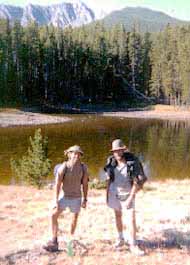 We originally planned to head deeper into the mountains to camp another night, but realized that we didn't have enough time left to get anywhere before we would have to leave again and head for home. Besides, I knew my extended family would be having a Labor Day picnic in the Pony park with lots of good food. So we cut the trip short by a day and plotted a direct course for home, following Rock Creek down to the South Boulder River, then up Bear Gulch to Windy pass and down Charcoal and Pony Creeks to our house.
We originally planned to head deeper into the mountains to camp another night, but realized that we didn't have enough time left to get anywhere before we would have to leave again and head for home. Besides, I knew my extended family would be having a Labor Day picnic in the Pony park with lots of good food. So we cut the trip short by a day and plotted a direct course for home, following Rock Creek down to the South Boulder River, then up Bear Gulch to Windy pass and down Charcoal and Pony Creeks to our house.
Bear Gulch is mostly National Forest land, except for a narrow strip of private land-only a few hundred feet wide--running right up the middle. We took the forest route into the canyon, then walked up the road to the saddle. Bear gulch was loaded with more wild raspberries than any place I have ever seen. To me, this was the real mountaineers walk: go a few steps and eat a handful of raspberries, than go a few more steps. Dustin shared these thoughts from his journal:
"During the week I learned and was shown a lot of new and wonderful things. Both Jeff and Tom had shown me a lot, and not all of it was about living off the land. I had made two new friends. One of the last things I learned from Tom though was about survival. Tom is a very quite, very polite, and very helpful person. A good man, but when it comes to wild raspberries he turns into a pushy, cut-in-front-of-you guy. Jeff and I just stood back and laughed to ourselves as we watched Tom in the raspberries."
Dustin worked as a surveyor for a number of years, so he explained some of the survey markers along the way up to Windy Pass. The pass was definitely windy and practically blew us over the top. This second day of hiking long distances in the mountains was definitely wearing on Jeff, and I was feeling it too, though Dustin seemed to find it easy. One thing about walking is that it seems to encourage the rambling internal dialogue, but I really focussed this time on staying in the present moment and being aware of every step of the way. Jeff shared these journal notes:
"The hiking we did the last day or so actually detracted from my nature awareness and skills because I was too tired to practice them. Looking back, however, I was practicing skills during some of these long hikes such as mental control, endurance, beginning surveying, map reading, and plant identification."
The walk downhill from Windy Pass was easy, and we quickly polished off the lasaugna at the family picnic, though we were a bit more dirty and hairy than anyone else there. Afterwards, Jeff reflected on the trip this way:
"My final impression of the trip was different from past trips. Upon returning to Pony, I initially felt a bit disheartened because the hiking seemed to dominate the trip (even though it did not). I wanted to build shelters and do more meditation and sit still more than we did. Despite these initial feelings, this trip deeply affected me and really held the mirror of myself up to my perception. I feel this trip brought on another turning point in my life to be more committed to a still mind and continual awareness. In that sense, it was a deeper experience than ever before. Also, I really learned some things about 'how to learn'. In that sense, this trip prepared me better to learn about shelters and plants and anything else of interest. I feel it is now time to take my own extended trip into the wildernesses of Montana, and continue what Tom has taught me."
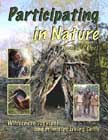
Go to Participating in Nature: Wilderness Survival and Primitive Living Skills
Return to the Primitive Living Skills Page




 Primitive Living Skills
Primitive Living Skills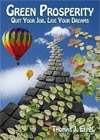
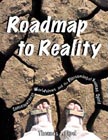
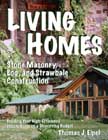

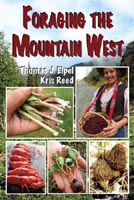

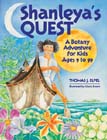
 Before picking up our packs again, we collected about sixty crayfish for dinner-- based on an estimated serving size of twenty each--then gathered a bunch more just because it was so much fun turning over rocks and catching the little clawed critters. It was a good thing we gathered them when we did, since we never found another good spot to harvest them. Downriver on the Jefferson, the crayfish were smaller and not nearly so abundant.
Before picking up our packs again, we collected about sixty crayfish for dinner-- based on an estimated serving size of twenty each--then gathered a bunch more just because it was so much fun turning over rocks and catching the little clawed critters. It was a good thing we gathered them when we did, since we never found another good spot to harvest them. Downriver on the Jefferson, the crayfish were smaller and not nearly so abundant. Getting to know each other takes a bit of time on these trips, especially since we are often walking, or working on certain skills, or simply engaged in solo time to explore nature on our own. Jeff, I feel like I know quite well from our previous trips and through continued correspondence via e-mail. We were both raised in suburban environments within a culture disconnected from the natural world. The wiring in our brains was patterned for suburban life, not for living outside or for using our hands and pocketknives to make useful things like bowdrill fire sets and packframes. I know how difficult it has been for me to learn most of these skills, and Jeff's journal notes ring very similar:
Getting to know each other takes a bit of time on these trips, especially since we are often walking, or working on certain skills, or simply engaged in solo time to explore nature on our own. Jeff, I feel like I know quite well from our previous trips and through continued correspondence via e-mail. We were both raised in suburban environments within a culture disconnected from the natural world. The wiring in our brains was patterned for suburban life, not for living outside or for using our hands and pocketknives to make useful things like bowdrill fire sets and packframes. I know how difficult it has been for me to learn most of these skills, and Jeff's journal notes ring very similar:  Finally we found the railroad bed and turned to walk down river on the rails. One thing that has to be said for human-made rails, trails and roads, is that you can really put the miles on in a hurry. We walked until dawn, then walked some more.
Finally we found the railroad bed and turned to walk down river on the rails. One thing that has to be said for human-made rails, trails and roads, is that you can really put the miles on in a hurry. We walked until dawn, then walked some more. One problem that needed attention was the cattail straps on Jeff's backpack. We improvised those straps from cattail leaf cordage on an earlier trip, and they worked great for awhile, but finally wore out. One of the straps actually came apart on the first day, about fifty yards from our drop-off point. I had an extra strap of buckskin and reinforced the strap to get by until we got around to replacing it. Later we had to reinforce it more with our bandanas, so this seemed like a good time to upgrade to newer straps. But instead of using cattail straps we experimented with clematis vines and twisted them into cordage. The clematis rope was easy to make and seemed like it would function well as a rope swing, or in any application where the rope was straight, but tying it into knots proved to be a real problem. Some of our knots were more than six inches in diameter. Cinching them down any tighter caused the vines to start snapping. Jeff managed to get by with the clematis straps for the rest of the trip, but they were problematic and not very comfortable. I guess we will stick with cattail straps in the future. Dustin and I were also able to finish some working bowdrill sets on that day, since we were otherwise borrowing Jeff's to start the fire.
One problem that needed attention was the cattail straps on Jeff's backpack. We improvised those straps from cattail leaf cordage on an earlier trip, and they worked great for awhile, but finally wore out. One of the straps actually came apart on the first day, about fifty yards from our drop-off point. I had an extra strap of buckskin and reinforced the strap to get by until we got around to replacing it. Later we had to reinforce it more with our bandanas, so this seemed like a good time to upgrade to newer straps. But instead of using cattail straps we experimented with clematis vines and twisted them into cordage. The clematis rope was easy to make and seemed like it would function well as a rope swing, or in any application where the rope was straight, but tying it into knots proved to be a real problem. Some of our knots were more than six inches in diameter. Cinching them down any tighter caused the vines to start snapping. Jeff managed to get by with the clematis straps for the rest of the trip, but they were problematic and not very comfortable. I guess we will stick with cattail straps in the future. Dustin and I were also able to finish some working bowdrill sets on that day, since we were otherwise borrowing Jeff's to start the fire.  The sunflower heads we rubbed on a rock and tore apart to knock the seeds out, which we then winnowed clean, but we never got around to actually using them. For dinner we "batter fried" the goosefoot greens, apple slices, and cattail shoots. Really it was more like pancakes loaded with greens, but it was really good. For desert we boiled up the "chokecherry-almond" mash with loads of sugar and served it on ashcakes, much like we did with the buffaloberries a couple days earlier. Although it tasted good, neither Jeff nor Dustin seemed to like the crunch of the pit shells.
The sunflower heads we rubbed on a rock and tore apart to knock the seeds out, which we then winnowed clean, but we never got around to actually using them. For dinner we "batter fried" the goosefoot greens, apple slices, and cattail shoots. Really it was more like pancakes loaded with greens, but it was really good. For desert we boiled up the "chokecherry-almond" mash with loads of sugar and served it on ashcakes, much like we did with the buffaloberries a couple days earlier. Although it tasted good, neither Jeff nor Dustin seemed to like the crunch of the pit shells.  We originally planned to head deeper into the mountains to camp another night, but realized that we didn't have enough time left to get anywhere before we would have to leave again and head for home. Besides, I knew my extended family would be having a Labor Day picnic in the Pony park with lots of good food. So we cut the trip short by a day and plotted a direct course for home, following Rock Creek down to the South Boulder River, then up Bear Gulch to Windy pass and down Charcoal and Pony Creeks to our house.
We originally planned to head deeper into the mountains to camp another night, but realized that we didn't have enough time left to get anywhere before we would have to leave again and head for home. Besides, I knew my extended family would be having a Labor Day picnic in the Pony park with lots of good food. So we cut the trip short by a day and plotted a direct course for home, following Rock Creek down to the South Boulder River, then up Bear Gulch to Windy pass and down Charcoal and Pony Creeks to our house.